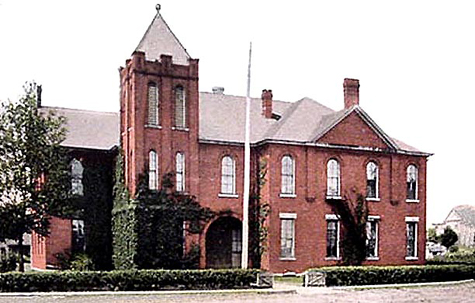My father grew up on E. Fairview Avenue just two blocks from Martha Wilder School at Myrtle and New, where he attended grammar school. His 2A report card for 1923 shows Alena Woodall as his teacher and Larry Childress the principal.

The building once had a unique large enclosed metal fire-escape chute that extended from the second floor to the ground. My grandmother Cox’s scrapbook contains an undated newspaper clipping with the heading “Martha Wilder Entertains.” The article deals with students giving “one of the most delightful and successful entertainments of all the spring festivities.” The program began with a welcome song by children from all six grades followed by a folk dance of eight girls from Miss Williams’ classroom with each young lady dressed in a snow-white dress.
To quote from the article: “The 'Train to Mauro' was the dramatic feature of the evening in which little Miss Dorothy Remine played the role of Mrs. Buttermilk, a country woman who believed ‘charity to all with her herbs and roots' and who had advice to spare to everybody. Little Buster Barlow as Johnny Buttermilk had come to the conclusion that nothing on earth could keep his mother from talking, especially when he was starving to death for a piece of ginger bread. The station clerk, played by Elbert Whiteside, did not appreciate Mrs. Buttermilk’s advice and was greatly irritated by her insistence on going ‘To Mauro’ today.”
Another routine portrayed Millicent Ffollett as “Springtime,” clad in a dainty white frock, wearing a fairy crown and possessing a magic wand. With each wave of it, she produced an array of lovely spring flowers, represented by little girls dressed in exquisite apparel displaying a wide variety of spring colors. Several small boys wearing white suits followed Springtime and sprinkled frost over the pretty flowers, causing them to wilt and die. Observing the demise of the flowers, Doris Serl, depicting the role of Queen of Sunbeams, appeared with her magic wand and smiled so warmly upon the flowers that they once again raised their graceful little heads and blossomed.
Other acts including “The Sick Doll,” a clever dialogue, and “Swing Song” by Ida Mae Walker were greatly enjoyed. The program finished with a reading by Miss Kate Remine, as she delightfully impersonated a charming yet mischievous little girl known as “Naughty Zell.” The teachers of Martha Wilder were highly commended for producing such a delightful program.
Grandma’s scrapbook also contained a brief death notice for Martha Wilder: “City Founder’s Daughter Dies – Funeral was held yesterday at Chattanooga for Martha Wilder, 88, for whom one of Johnson City’s oldest schools was named. She died Sunday at her home in Media, Pa.” The clipping identified Martha as a daughter of the late Gen. John Thomas Wilder, a founder of Johnson City who gave land for the school in 1892. The property later became the site of a vocational training facility and eventually the city’s Senior Center. Another school, Annie Wilder Stratton, was named for Martha’s sister who married Frank Stratton.
Gen. Wilder was a Union Army officer who led the Union forces against Chattanooga in August 1863. Shortly after the close of the war, he relocated from New York to the Chestoa section of what is now Unicoi County.
During the industrialist’s lifetime, he built several hydroelectric power dams in the area, operated two blast furnaces and constructed two hotels on Roan Mountain, a log building and the popular Cloudland Hotel that was destroyed by fire in 1885.

Comments are closed.